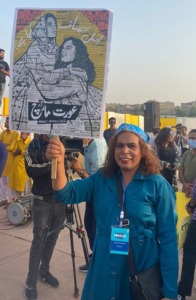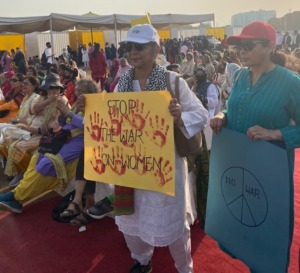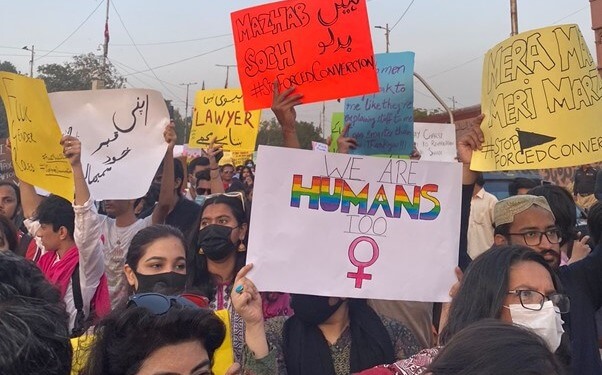This is a tale of feminism, globalization and conservative backlash. Qandell Baloch became known in Pakistan in 2013, after auditioning for Pakistan Idol. She obtained a large influence on the country due to her defiant social media posts and statements against Pakistani patriarchal norms and customs. Despite having received continued abuse and death threats, she persisted in her advocacy efforts until she was murdered by her brother in 2016.
Her brother was later arrested and sentenced to life in prison. He told the press of having no remorse over his actions. Her killing unleashed turmoil all over the country, and the frustration and indignation generated by it acted as catalyzers for the strengthening of the Pakistani feminist community. The upscaling of the movement could be shown from many indicators, but perhaps the most compelling is the evolution of the Aurat marches.
Aurat marches began in 2018, when only one march was held in Pakistan’s most populous city, Karachi. Year after year, support for it grew alongside opposition, and an urban protest has now turned into a social movement. The demonstration is indeed nationwide as of 2022, with chapters present in all major Pakistani cities.
The marches now include LGBTQ+ exponents and advocate for various sets of provisions, not necessarily limited to women’s rights. The organizers appeal for a different set of requests depending on the region. Karachi’s chapter is geared toward labor market reforms and social security, demanding safe housing, quality education and affordable healthcare for all workers. They ask in particular to fight economic violence on women’s labor and to put an end to child labor. Lahore’s protest is instead focused on “Asal Insaaf”, “Reimagining justice”.
The organizers drafted a manifesto that encompasses critiques to the criminal justice systems; proposals of reform tailored on assisting survivors with psycho-social support and measures for the rehabilitation of perpetrators. The supporters of the manifesto claim justice have to be rethought from the ground up to make Pakistan a more inclusive and equitable society.

Zehrish Khanzadi, a representative of the Pakistani transgender community, recently stated that Pakistan is a country “where God gave us life but society doesn’t give us respect”. Supporting a different opinion is an over-ambitious rhetoric exercise, grazing provocation.
In any society, respect and dignity are promoted, sustained and enforced by its government. Zia ur-Rehman reported for the times that “Pakistan’s minister for religious affairs, Noorul Haq Qadri, claimed [the Aurat March] violates the principles of Islam. He recently asked Prime minister Imran Khan to declare March 8 to be International Hijab day”.
Ur-Rehman reports also that Islamist groups, instead of respect, pondered whether to bring something else to the march: “if the government allows it, we will use a baton to stop it”, said Abdul Majeed Hazarvi, local exponent of the Jamiat-e-Ulema Islam-Fazl party.
Why feminism clashes against religious conservatism
Feminism is imported from the West by globalization – and clashes with conservative forces in society are part of the process. In fact, Feminist and LGBTQ+ movements clashing with religious conservatism is not a phenomenon endogenous to Islamic countries. For example, Italy’s parliament blocked the entry into force of a law decree (Ddl Zan) that would have recognized crimes committed against the LGBTQ+ community or disabled people as hate crimes. The Vatican was among the opposing parties.
Even if the main counterargument against the enactment of the law was that it mutilated freedom of expression, it is evident that traditionalist and religious-based ideologies played a major role in shaping the public debate and determining the legislative result.
In general, one can recognize a worldwide pattern of confrontation between tradition and globalization which is unfolding across all layers of society. The economic outcomes of globalization are explored and discussed widely, an example being the delocalization of labor. Such phenomenon generates cleavages between western clusters of heavy industry – which increasingly resemble wastelands as each day passes – and centers of production in developing countries offering low-cost manpower, which instead thrive from outsourcing of investment.

A less investigated trend is the cultural one. One of its determinations is the stand-off between social inclusion and conservative traditionalism. A specific example is the struggle of feminist movements in spreading dignity to social minorities in Pakistan. What makes the cultural confrontation layer more critical than the others is that in the economic one, for instance, the worst thing that can happen is that people end up losing their job.
Cultural cleavages, instead, make minorities lose much more.
Last summer Zahir Jaffer, the 30-year-old son of an influential Pakistani family, murdered Noor Mukadam, 27, daughter of a Pakistani diplomat, over a jealousy episode. Another case that sent shock waves all over Pakistan. Jaffer was sentenced to death two weeks ago for the murder, but justice in Pakistan is not always this resolute when it comes to protecting women’s rights.
Remember Qandeel Baloch’s brother? After serving less than 6 years in prison, he was condoned by his family, which asked for his release. They obtained it less than a month ago. He is now a free man.
Editor’s Note: The opinions expressed here by Impakter.com columnists are their own, not those of Impakter.com. Featured Photo: Close up on banners during the 2022 Aurat march. Credits: Hiba Ali Naqvi.










